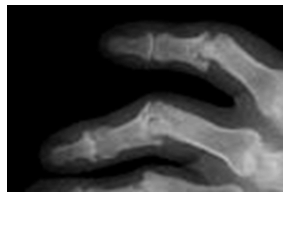
There are currently no biologic treatment options available for patients with psoriatic arthritis (PsA) who are non-responsive to traditional non-biologic DMARDs and TNF inhibitors. Interleukins (IL) 12 and 23 have been implicated in the pathogenesis of plaque psoriasis. A humanized monoclonal antibody directed against these cytokines, ustekinumab, has demonstrated efficacy in the treatment of psoriasis in late phase trials. IL 12/23 is also implicated in the mechanism of joint damage in PsA. Here, Gottlieb et al (Lancet 2009; 373: 633) reports the results of a phase II randomized placebo controlled clinical trial of ustekinumab in patients with PsA.
Methods
Adults with active PsA with plaque psoriasis (defined as 3 or more swollen and tender joints and either CRP > 15 mg/L or morning stiffness ≥ 45 minutes) from 24 centers in North America and Europe were randomized to receive ustekinumab 90 mg (later changed to 63 mg) as a subcutaneous injection in a 1:1 cross-over design. Patients randomized to receive ustekinumab initially received active drug weekly for the first 4 weeks, then placebo at weeks 12 and 16. Patients randomized to the delayed group received placebo weekly for the first 4 weeks, then active drug at weeks 12 and 16. Patients were required to have had an inadequate response to prior treatment (DMARDs, TNF inhibitors, or NSAIDs) and could be receiving concomitant stable methotrexate (up to 25 mg per week), corticosteroids (up to 10 mg per week), or NSAIDs. TNF inhibitors and topical psoriasis drugs required discontinuation for set periods prior to randomization. Enrollment was stratified to include no more than 20% of patients with prior exposure to TNF inhibitors, with equal allotment to each group.
ACR 20 response at week 12 was the primary efficacy endpoint. Secondary endpoints included ACR 50 and 70 responses, HAQ, and improvements in skin psoriasis using the psoriasis area and severity index (PASI).
Results
A total of 146 patients were enrolled (n=76 to receive ustekinumab and n=70 to placebo). There were 2 withdrawals before week12 in the ustekinumab group compared to 7 in the placebo group. Of the 63 remaining patients who received initial placebo, 57 received ustekinumab in the cross-over phase. A total of 63 of the patients who initially received ustekinumab completed through week 36 while 52 of the initially placebo treated patients completed through week 36.
Approximately 45% of the enrolled patients were women with a mean age of approximately 49 years and a median duration of disease of approximately 5 years. Patients had a median of approximately 8 swollen and 18 tender joints at enrollment and median HAQ scores of 0.8 indicated moderate disability for the groups. Prior DMARDs were used in about two-thirds and no patients were currently using corticosteroids. Approximately 25% had used biologics in the past, although about half of these were biologics used primarily to treat psoriasis.
| Efficacy Endpoints at 12 weeks | |||
| Ustekinumab N=76 |
Placebo N=70 |
p | |
| ACR20 | 42% | 14% | 0.0002 |
| ACR50 | 25% | 7% | 0.0038 |
| ACR70 | 11% | 0% | 0.0055 |
| Change in HAQ (median) | -0.25 | 0.00 | 0.0005 |
| PASI75 | 52% | 5% | <0.0001 |
By week 12, any adverse events (AEs) were reported in 62% of patients, with 3% discontinuing due to AEs. No serious adverse events (SAEs) were noted by week 12 in ustekinumab treated patients compared to 3 in the placebo group. By week 36, 6 ustekinumab treated patients reported SAEs (one each of syncope, respiratory tract infection, hemorrhagic stroke, congestive heart failure/myocardial infarction/hypertension, chest pain, gastric ulcer hemorrhage). One recurrent basal cell carcinoma was reported in a ustekinumab treated patient.
Conclusions
In this phase II clinical trial, ustekinumab was superior to placebo in controlling the signs and symptoms of psoriatic arthritis. No major safety signals were detected.
Editorial Comment
New therapies are needed to treat patients with refractory psoriatic arthritis, and the availability of a biologic with a mechanism differing from the TNF inhibitors would be a welcome addition to the rheumatologist’s armamentarium. Although this is a relatively small trial and designed mainly to determine safety rather than efficacy, the efficacy of ustekinumab for arthritis actually seems rather modest, with 58% of treated patients failing to have a minimal clinical response and 75% failing to have a meaningful response (i.e. ACR50). Whether these responses would improve with dosing greater than 4 weeks remains to be determined. However, improvements in skin psoriasis are fairly robust (as has been shown in other trials). The lack of safety signals in the trial is reassuring, but larger trials with more prolonged administration of the agent are required for reassurance.

